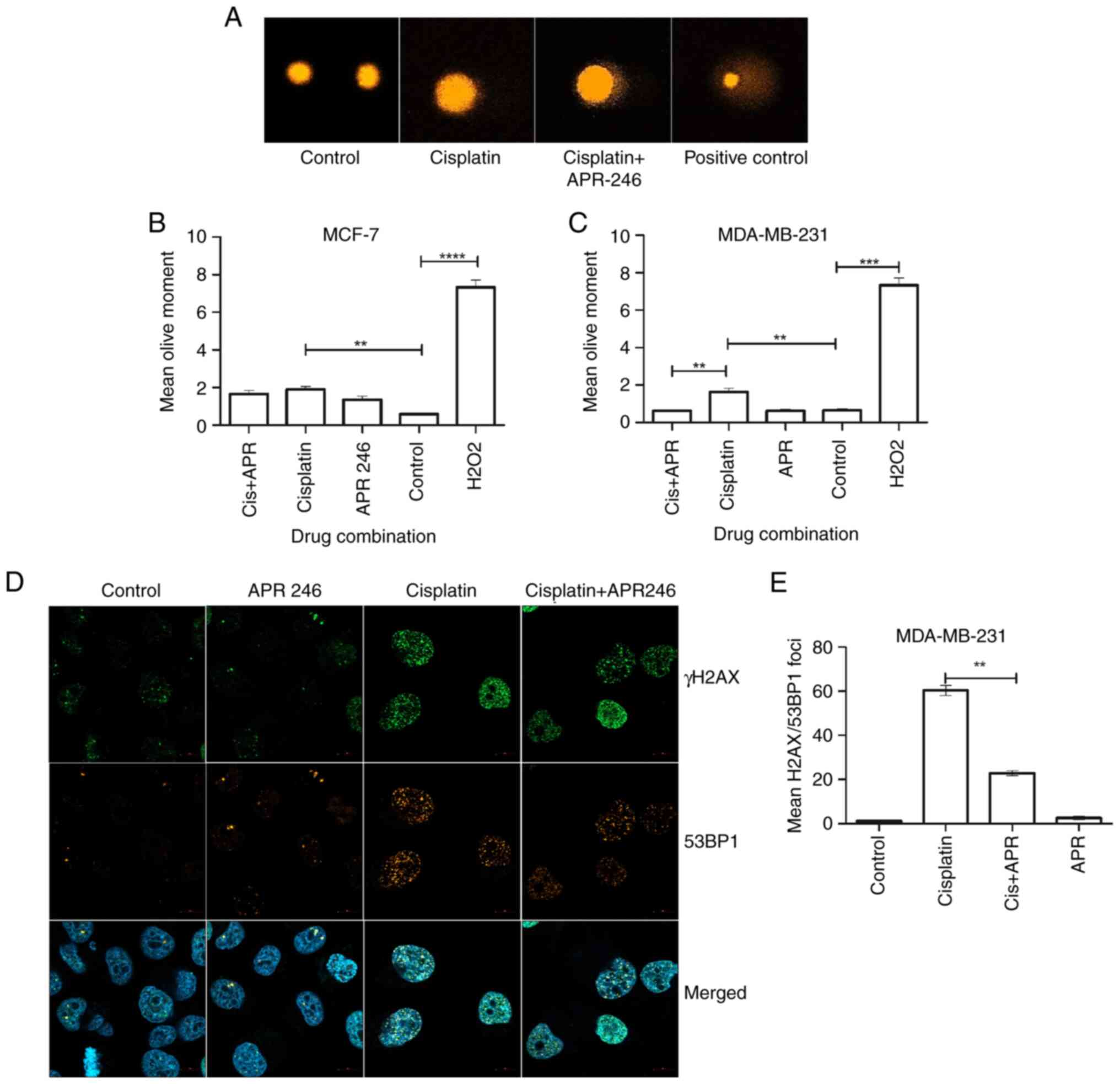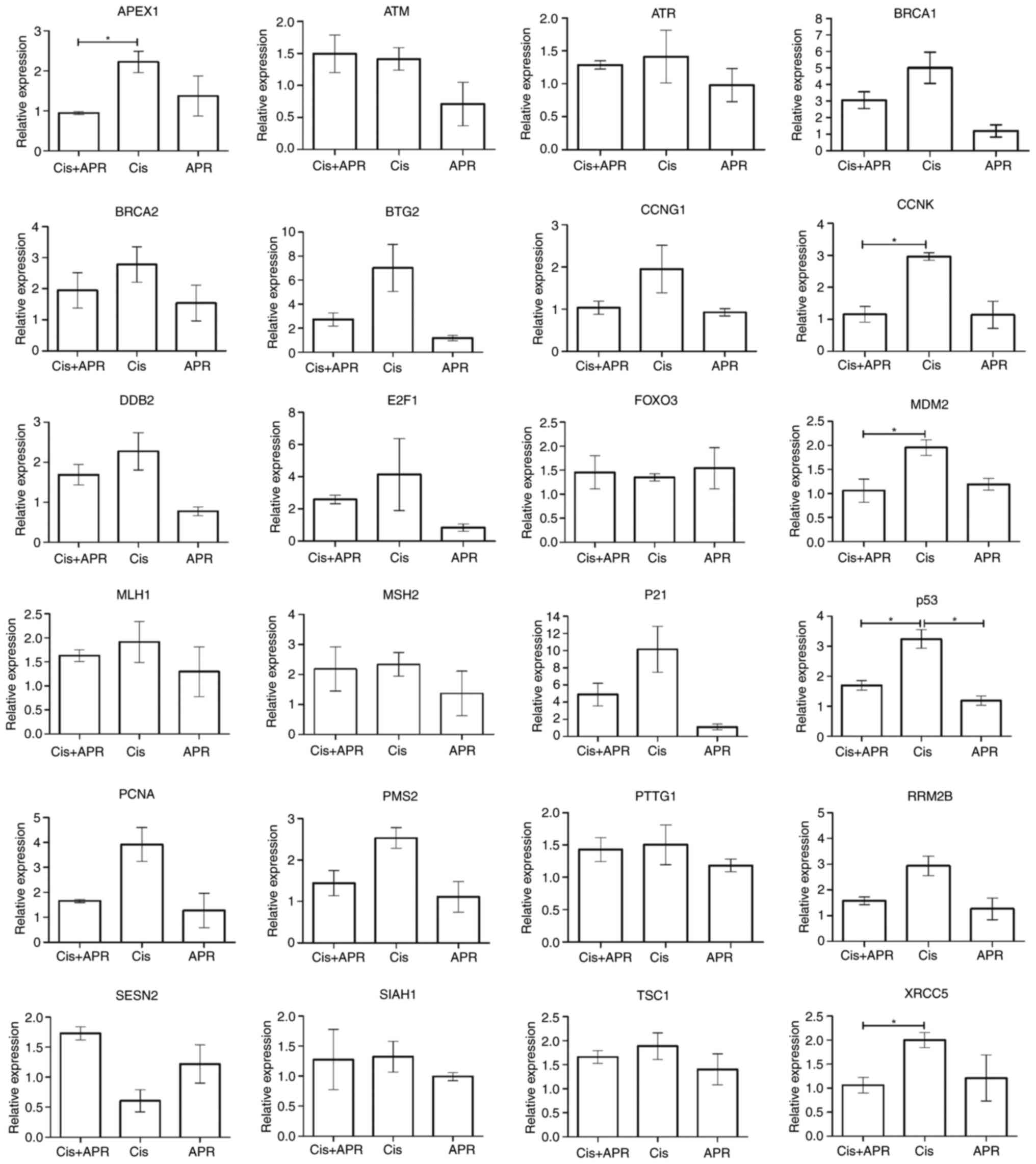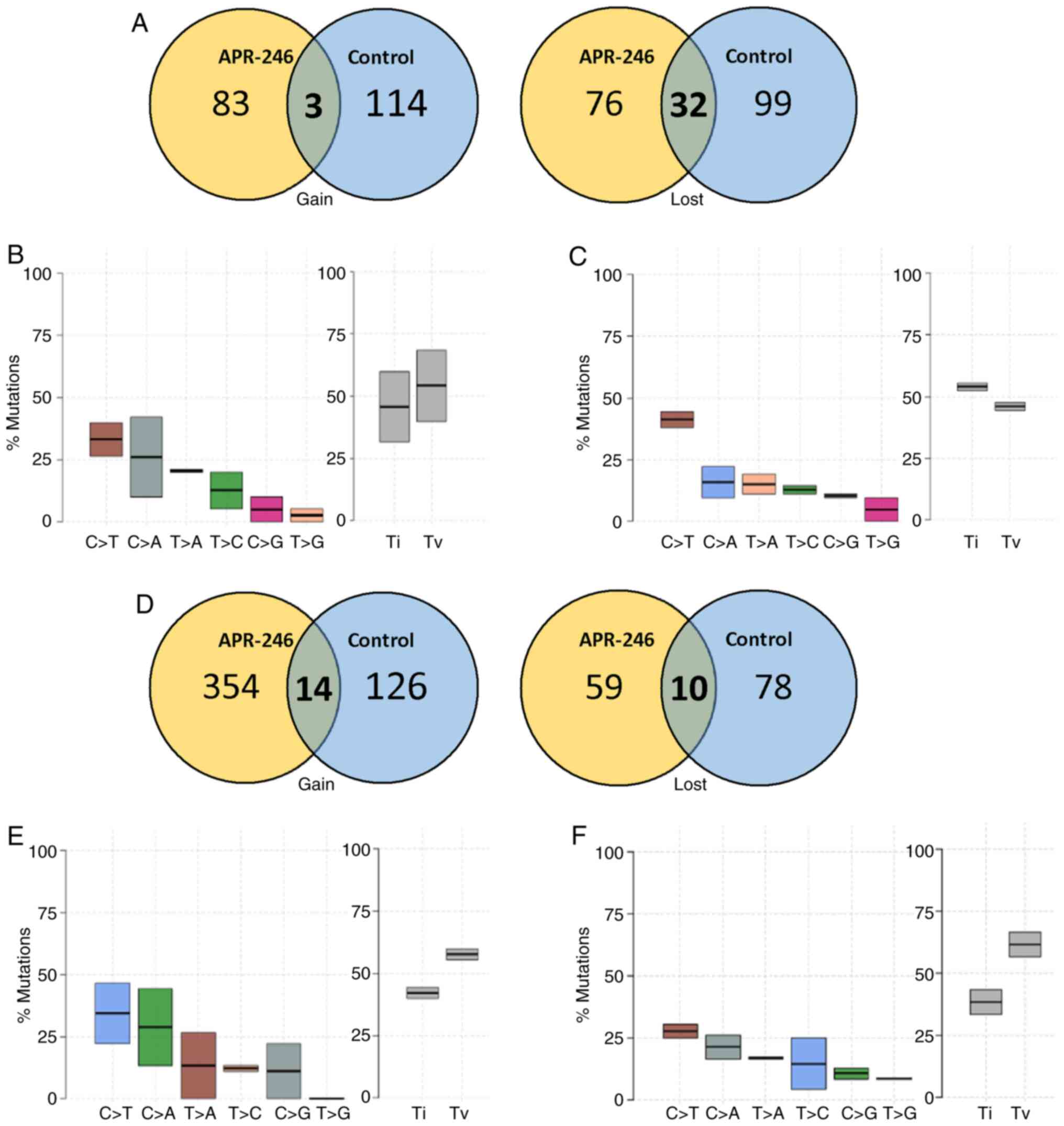|
1
|
Rieber M and Strasberg-Rieber M: Hypoxia,
Mn-SOD and H2O2 regulate p53 reactivation and
PRIMA-1 toxicity irrespective of p53 status in human breast cancer
cells. Biochem Pharmacol. 84:1563–1570. 2012. View Article : Google Scholar : PubMed/NCBI
|
|
2
|
Brady CA, Jiang D, Mello SS, Johnson TM,
Jarvis LA, Kozak MM, Kenzelmann Broz D, Basak S, Park EJ,
McLaughlin ME, et al: Distinct p53 transcriptional programs dictate
acute DNA-damage responses and tumor suppression. Cell.
145:571–583. 2011. View Article : Google Scholar : PubMed/NCBI
|
|
3
|
Gupta A, Shah K, Oza MJ and Behl T:
Reactivation of p53 gene by MDM2 inhibitors: A novel therapy for
cancer treatment. Biomed Pharmacother. 109:484–492. 2019.
View Article : Google Scholar : PubMed/NCBI
|
|
4
|
Labuschagne CF, Zani F and Vousden KH:
Control of metabolism by p53-Cancer and beyond. Biochim Biophys
Acta Rev Cancer. 1870:32–42. 2018. View Article : Google Scholar : PubMed/NCBI
|
|
5
|
Nakayama M, Hong CP, Oshima H, Sakai E,
Kim SJ and Oshima M: Loss of wild-type p53 promotes mutant
p53-driven metastasis through acquisition of survival and
tumor-initiating properties. Nat Commun. 11:23332020. View Article : Google Scholar : PubMed/NCBI
|
|
6
|
Forbes SA, Beare D, Boutselakis H, Bamford
S, Bindal N, Tate J, Cole CG, Ward S, Dawson E, Ponting L, et al:
COSMIC: Somatic cancer genetics at high-resolution. Nucleic Acids
Res. 45((D1)): D777–D783. 2017. View Article : Google Scholar : PubMed/NCBI
|
|
7
|
Bouaoun L, Sonkin D, Ardin M, Hollstein M,
Byrnes G, Zavadil J and Olivier M: TP53 Variations in human
cancers: New lessons from the IARC TP53 database and genomics data.
Hum Mutat. 37:865–876. 2016. View Article : Google Scholar : PubMed/NCBI
|
|
8
|
Hwang LA, Phang BH, Liew OW, Iqbal J, Koh
XH, Koh XY, Othman R, Xue Y, Richards AM, Lane DP and Sabapathy K:
Monoclonal antibodies against specific p53 hotspot mutants as
potential tools for precision medicine. Cell Rep. 22:299–312. 2018.
View Article : Google Scholar : PubMed/NCBI
|
|
9
|
van Oijen MG and Slootweg PJ:
Gain-of-function mutations in the tumor suppressor gene p53. Clin
Cancer Res. 6:2138–2145. 2000.PubMed/NCBI
|
|
10
|
Sears CR and Turchi JJ: Complex
cisplatin-double strand break (DSB) lesions directly impair
cellular non-homologous end-joining (NHEJ) independent of
downstream damage response (DDR) pathways. J Biol Chem.
287:24263–24272. 2012. View Article : Google Scholar : PubMed/NCBI
|
|
11
|
Bykov VJ and Wiman KG: Mutant p53
reactivation by small molecules makes its way to the clinic. FEBS
Lett. 588:2622–2627. 2014. View Article : Google Scholar : PubMed/NCBI
|
|
12
|
Liu DS, Read M, Cullinane C, Azar WJ,
Fennell CM, Montgomery KG, Haupt S, Haupt Y, Wiman KG, Duong CP, et
al: APR-246 potently inhibits tumour growth and overcomes
chemoresistance in preclinical models of oesophageal
adenocarcinoma. Gut. 64:1506–1516. 2015. View Article : Google Scholar : PubMed/NCBI
|
|
13
|
Russo D, Ottaggio L, Foggetti G, Masini M,
Masiello P, Fronza G and Menichini P: PRIMA-1 induces autophagy in
cancer cells carrying mutant or wild type p53. Biochim Biophys
Acta. 1833:1904–1913. 2013. View Article : Google Scholar : PubMed/NCBI
|
|
14
|
Perdrix A, Najem A, Saussez S, Awada A,
Journe F, Ghanem G and Krayem M: PRIMA-1 and PRIMA-1Met
(APR-246): From mutant/wild type p53 reactivation to unexpected
mechanisms underlying their potent anti-tumor effect in
combinatorial therapies. Cancers (Basel). 9:1722017. View Article : Google Scholar : PubMed/NCBI
|
|
15
|
Zhang Q, Bykov VJN, Wiman KG and
Zawacka-Pankau J: APR-246 reactivates mutant p53 by targeting
cysteines 124 and 277. Cell Death Dis. 9:4392018. View Article : Google Scholar : PubMed/NCBI
|
|
16
|
Muller PA and Vousden KH: Mutant p53 in
cancer: New functions and therapeutic opportunities. Cancer Cell.
25:304–317. 2014. View Article : Google Scholar : PubMed/NCBI
|
|
17
|
Chollat-Namy M, Ben Safta-Saadoun T,
Haferssas D, Meurice G, Chouaib S and Thiery J: The pharmalogical
reactivation of p53 function improves breast tumor cell lysis by
granzyme B and NK cells through induction of autophagy. Cell Death
Dis. 10:6952019. View Article : Google Scholar : PubMed/NCBI
|
|
18
|
Hansen SN, Ehlers NS, Zhu S, Thomsen MB,
Nielsen RL, Liu D, Wang G, Hou Y, Zhang X, Xu X, et al: The
stepwise evolution of the exome during acquisition of docetaxel
resistance in breast cancer cells. BMC Genomics. 17:4422016.
View Article : Google Scholar : PubMed/NCBI
|
|
19
|
Olive PL and Banath JP: The comet assay: A
method to measure DNA damage in individual cells. Nat Protoc.
1:23–29. 2006. View Article : Google Scholar : PubMed/NCBI
|
|
20
|
Gyori BM, Venkatachalam G, Thiagarajan PS,
Hsu D and Clement MV: OpenComet: An automated tool for comet assay
image analysis. Redox Biol. 2:457–465. 2014. View Article : Google Scholar : PubMed/NCBI
|
|
21
|
Koboldt DC, Zhang Q, Larson DE, Shen D,
McLellan MD, Lin L, Miller CA, Mardis ER, Ding L and Wilson RK:
VarScan 2: Somatic mutation and copy number alteration discovery in
cancer by exome sequencing. Genome Res. 22:568–576. 2012.
View Article : Google Scholar : PubMed/NCBI
|
|
22
|
McLaren W, Gil L, Hunt SE, Riat HS,
Ritchie GR, Thormann A, Flicek P and Cunningham F: The ensembl
variant effect predictor. Genome Biol. 17:1222016. View Article : Google Scholar : PubMed/NCBI
|
|
23
|
Mayakonda A, Lin DC, Assenov Y, Plass C
and Koeffler HP: Maftools: Efficient and comprehensive analysis of
somatic variants in cancer. Genome Res. 28:1747–1756. 2018.
View Article : Google Scholar : PubMed/NCBI
|
|
24
|
Pilch DR, Sedelnikova OA, Redon C, Celeste
A, Nussenzweig A and Bonner WM: Characteristics of gamma-H2AX foci
at DNA double-strand breaks sites. Biochem Cell Biol. 81:123–129.
2003. View
Article : Google Scholar : PubMed/NCBI
|
|
25
|
Berkers CR, Maddocks OD, Cheung EC, Mor I
and Vousden KH: Metabolic regulation by p53 family members. Cell
Metab. 18:617–633. 2013. View Article : Google Scholar : PubMed/NCBI
|
|
26
|
Williams AB and Schumacher B: p53 in the
DNA-damage-repair process. Cold Spring Harb Perspect Med.
6:a0260702016. View Article : Google Scholar : PubMed/NCBI
|
|
27
|
Yu X, Vazquez A, Levine AJ and Carpizo DR:
Allele-specific p53 mutant reactivation. Cancer Cell. 21:614–625.
2012. View Article : Google Scholar : PubMed/NCBI
|
|
28
|
Liang Y, Besch-Williford C, Benakanakere
I, Thorpe PE and Hyder SM: Targeting mutant p53 protein and the
tumor vasculature: An effective combination therapy for advanced
breast tumors. Breast Cancer Res Treat. 125:407–420. 2011.
View Article : Google Scholar : PubMed/NCBI
|
|
29
|
Liang Y, Besch-Williford C, Cook MT,
Belenchia A, Brekken RA and Hyder SM: APR-246 alone and in
combination with a phosphatidylserine-targeting antibody inhibits
lung metastasis of human triple-negative breast cancer cells in
nude mice. Breast Cancer (Dove Med Press). 11:249–259.
2019.PubMed/NCBI
|
|
30
|
Lambert JM, Gorzov P, Veprintsev DB,
Söderqvist M, Segerbäck D, Bergman J, Fersht AR, Hainaut P, Wiman
KG and Bykov VJ: PRIMA-1 reactivates mutant p53 by covalent binding
to the core domain. Cancer Cell. 15:376–388. 2009. View Article : Google Scholar : PubMed/NCBI
|
|
31
|
Li XL, Zhou J, Chan ZL, Chooi JY, Chen ZR
and Chng WJ: PRIMA-1met (APR-246) inhibits growth of colorectal
cancer cells with different p53 status through distinct mechanisms.
Oncotarget. 6:36689–36699. 2015. View Article : Google Scholar : PubMed/NCBI
|
|
32
|
Li XL, Zhou J, Xia CJ, Min H, Lu ZK and
Chen ZR: PRIMA-1met induces autophagy in colorectal cancer cells
through upregulation of the mTOR/AMPK-ULK1-Vps34 signaling cascade.
Oncol Rep. 45:862021. View Article : Google Scholar : PubMed/NCBI
|
|
33
|
Makhale A, Nanayakkara D, Raninga P,
Khanna KK and Kalimutho M: CX-5461 enhances the efficacy of APR-246
via induction of DNA damage and replication stress in
triple-negative breast cancer. Int J Mol Sci. 22:57822021.
View Article : Google Scholar : PubMed/NCBI
|
|
34
|
Synnott NC, Madden SF, Bykov VJN, Crown J,
Wiman KG and Duffy MJ: The mutant p53-targeting compound APR-246
Induces ROS-modulating genes in breast cancer cells. Transl Oncol.
11:1343–1349. 2018. View Article : Google Scholar : PubMed/NCBI
|
|
35
|
Mantovani F, Collavin L and Del Sal G:
Mutant p53 as a guardian of the cancer cell. Cell Death Differ.
26:199–212. 2019. View Article : Google Scholar : PubMed/NCBI
|
|
36
|
Srinivas US, Tan BWQ, Vellayappan BA and
Jeyasekharan AD: ROS and the DNA damage response in cancer. Redox
Biol. 25:1010842019. View Article : Google Scholar : PubMed/NCBI
|
|
37
|
Khanna A: DNA damage in cancer
therapeutics: A boon or a curse? Cancer Res. 75:2133–2138. 2015.
View Article : Google Scholar : PubMed/NCBI
|
|
38
|
Garcia-de Teresa B, Hernandez-Gomez M and
Frias S: DNA Damage as a driver for growth delay: Chromosome
instability syndromes with intrauterine growth retardation. Biomed
Res Int. 2017:81938922017. View Article : Google Scholar : PubMed/NCBI
|
|
39
|
Eischen CM: Genome stability requires p53.
Cold Spring Harb Perspect Med. 6:a0260962016. View Article : Google Scholar : PubMed/NCBI
|
|
40
|
Zhu G, Pan C, Bei JX, Li B, Liang C, Xu Y
and Fu X: Mutant p53 in Cancer progression and targeted therapies.
Front Oncol. 10:5951872020. View Article : Google Scholar : PubMed/NCBI
|
|
41
|
Watanabe N, Okochi E, Mochizuki M,
Sugimura T and Ushijima T: The presence of single nucleotide
instability in human breast cancer cell lines. Cancer Res.
61:7739–7742. 2001.PubMed/NCBI
|

















